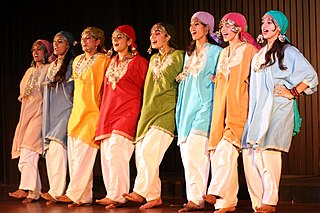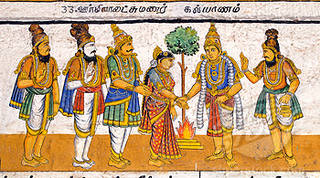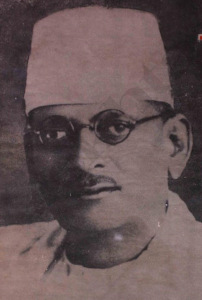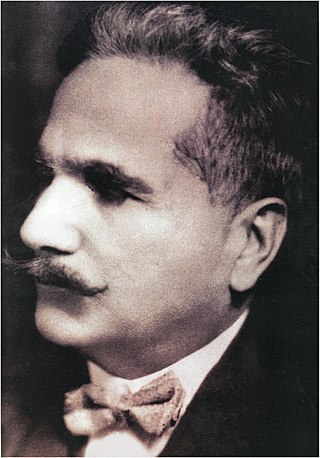Related Research Articles

Lakshmana, also known as Laxmana, Lakhan, Saumitra, and Ramanuja, is the younger brother of Rama in the Hindu epic Ramayana. He is considered as an incarnation of Shesha, the lord of serpents. Lakshmana was married to Urmila, and is known for his loyalty and dedication towards Rama.
Lalleshwari, also commonly known as Lal Ded, was a Kashmiri mystic of the Kashmir Shaivism school of Hindu philosophy. She was the creator of the style of mystic poetry called vatsun or Vakhs, meaning "speech". Known as Lal Vakhs, her verses are among the early compositions in the Kashmiri language and are a part in the history of modern Kashmiri literature.

Kashmiri or Koshur is a Dardic Indo-Aryan language spoken by around 7 million Kashmiris of the Kashmir region, primarily in the Kashmir Valley and Chenab Valley of the Indian-administrated union territory of Jammu and Kashmir, over half the population of that territory. Kashmiri has split ergativity and the unusual verb-second word order.

Muzaffarabad is a city in Pakistani-administered Azad Kashmir in the disputed Kashmir region. It is the largest city and the capital of Azad Kashmir, which is a Pakistani-administered administrative territory.

Sita, also known as Siya, Janaki and Maithili, is a Hindu goddess and the female protagonist of the Hindu epic Ramayana. Sita is the consort of Rama, the avatar of god Vishnu, and is regarded as an avatar of goddess Lakshmi. She is the chief goddess of the Ramanandi Sampradaya and is the goddess of beauty and devotion. Sita's birthday is celebrated every year on the occasion of Sita Navami.

Kashmiris are an Indo-Aryan ethnolinguistic group speaking the Kashmiri language and originating from the Kashmir Valley, which is today located in Indian-administered Jammu and Kashmir.

Urmila, is a Hindu goddess and the princess of Videha in the Hindu epic Ramayana. She is considered to be an avatāra of Nagalakshmi, the serpent goddess. Urmila was married to Lakshmana and is known for her dedication towards her husband, for her sacrifice.

The Nawab of Dhaka, originally spelt in English Nawab of Dacca, was the title of the head of one of the largest Muslim zamindar in British Bengal and Assam, based in present-day Dhaka, Bangladesh. The title of nawab, similar to the British peerage, was conferred upon the head of the family by Queen Victoria as a recognition of the first Nawab's loyalty and contribution to the social welfare activities.
Zinda Kaul (1884–1965) was an Indian poet, writer and teacher. He composed in Persian, Hindi, Urdu and Kashmiri. Kaul also translated works of Kashmiri into English, Persian and Hindi.

Anand Narain Mulla was an Indian Urdu poet. He served as a Member of Parliament in both the Lok Sabha and the Rajya Sabha.
Athmuqam or Athmakam is a tehsil of Neelum District in Azad Kashmir, Pakistan. It is situated about 73 kilometres (45 mi) from Muzaffarabad. Athmuqam is the headquarters of Neelum District. Its population was 7,922 in 2017.

Agha Hashar Kashmiri was an Urdu poet, playwright and dramatist. A number of his plays were Indian Shakespearean adaptations.

Sir Muhammad Iqbal was a South Asian Islamic philosopher, poet and politician. His poetry is considered to be among the greatest of the 20th century, and his vision of a cultural and political ideal for the Muslims of British-ruled India is widely regarded as having animated the impulse for the Pakistan Movement. He is commonly referred to by the honourific Allama and widely considered one of the most important and influential Muslim thinkers and Western religious philosophers of the 20th century.

Professor Ghulam Nabi Firaq was a Kashmiri poet, writer and an educationist.
Asir-e-Hirs is an Urdu play by Agha Hashar Kashmiri. It was published in 1900.
Yahudi Ki Ladki is a historical Urdu play by Agha Hashar Kashmiri, on the theme of persecution of Jews by the Romans. It was first published in 1913. The play became his best known work, and a classic in Parsi-Urdu theatre.
Turki Hur is an Urdu play by Agha Hashar Kashmiri. It was published in 1922. It was adapted into an Indian silent film, Turki Hoor, in 1928 by J. J. Madan.
Aankh ka Nasha or Ankh ka Nasha is an Urdu play by Agha Hashar Kashmiri. It was first published in 1924.

Rustom O Sohrab or Rustam-Sohrab is an Urdu play by Agha Hashar Kashmiri. It was first published in 1929.
Said-e-Havas or (Greed) also known as King John is a 1936 Hindi/Urdu film adaptation of the Shakespeare play, King John, directed by Sohrab Modi. It was based on the Urdu play Said-e-Hawas by Agha Hashar Kashmiri, published in 1908.
References
- ↑ Samiuddin, Abida (1 August 2007). Encyclopaedic Dictionary Of Urdu Literature (2 Vols. Set). Global Vision Publishing Ho. p. 337. ISBN 978-81-8220-191-0 . Retrieved 3 October 2012.
- ↑ Khan, Abdul Jamil (30 August 2006). Urdu/Hindi: An Artificial Divide : African Heritage, Mesopotamian Roots, Indian Culture & Britiah Colonialism. Algora Publishing. p. 319. ISBN 978-0-87586-438-9 . Retrieved 3 October 2012.